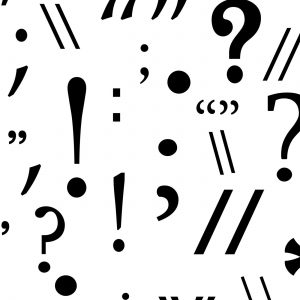“I will question you …” (Job 38:3a; 40:7; 42:4)
“Jesus said to them, ‘I will ask you one question …'” (Mark 11:29)

Periods are boundary markers. They limit, mark off, define. Periods are specks, scattered indiscriminately and profusely across the landscape of our conversations to guide us on our way. Periods are plentiful, profuse, prolific–with a gestation of mere seconds before one spawns a fresh litter of statements, assertions and observations. Periods are too commonplace to arrest anyone’s attention. Periods can become self-centered, too quick to assert what one thinks he knows. Periods at one and the same time both define and bore.
Explanation points on the other hand are tall, elegant and demanding. Exclamation points are brash, bold and boisterous. They are found far less frequently than the common period, but in this way they serve their purpose–to arouse interest, to demand attention, to scream “Here! Look at me!” Yet the exclamation point’s power diminishes with its proliferation. Not everything can be urgent and ultimate. Not everything can be equally worthy of immediate attention.
Then there is the question mark–that lonely, bent figure, humbled under the weight of its query. What is this? Is a question mark a period risen up in protest in the face of assertions and declarations shouted loudly and presumed upon universally? Or is it an exclamation point that has gone off prematurely and now wilted under the weight of what was once giddy excitement and bravado? Or is the question mark a humble, bowing invitation to leave off our boastful assertions and our loud exclamations and to enter into real communication, genuine relationship?
The period is too nondescript to demand attention. The exclamation point is too gaudy for long term serious consideration. The question mark, however, is where real conversation begins. The question mark is the place where communication is birthed.

